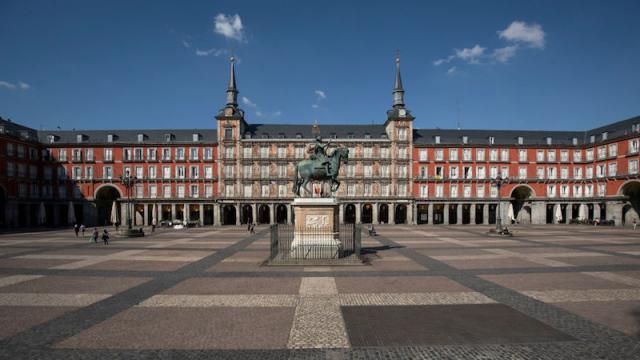Days after neighbouring Italy locked down the entire country because of the novel coronavirus, Spain declared a state of emergency and announced that it will become the second European country to impose these drastic measures to control the spread of the virus. The message to the public was clear: Stay home.
[referenced url=” thumb=” title=” excerpt=”]
Spanish Prime Minister Pedro Sánchez announced the lockdown, which will affect 47 million people, in a primetime address on Saturday evening. Sánchez said that people would only be allowed to leave their homes for a short list of reasons: to buy food and medicine; to go to work if they cannot work remotely; to visit healthcare centres; to help the elderly and others in need; to go to financial institutions; or due to unforeseen, extreme circumstances.
People that leave their homes for the above reasons must do so alone, Sánchez said. Only people with disabilities or that require assistance that can be justified will be allowed to leave their homes with someone to assist them. Individuals who go out in public must keep one metre (3.2 feet) of distance between one another.
In the decree published on Saturday, the government stated that the measures were being taken to “protect the health and security of citizens, contain the progression of the disease and bolster the public healthcare system.” Officials will gain authority over all police forces and will deploy the military if necessary. The lockdown will last for 15 days, but it can be extended.
Spain also closed all bars, restaurants and shops that sell anything other than food and select items, such as medical products, hygiene products and technological equipment, among others. It cancelled in-person primary, secondary and university classes, as well as any other public or private educational activity. Museums, libraries, monuments and businesses offering leisure activities were also ordered to close.
On Saturday, Sánchez stressed that the virus and the pandemic were the country’s enemies and that everyone had to fight them together. The prime minister said that the country will face difficult times in the weeks ahead, full of effort and sacrifice.
“The victory over the virus will begin when the number of medical discharges is higher than the number of new infections, it will be even greater when transmission numbers drop drastically,” Sánchez said in his national address. “It’ll be in that moment when our economy will strongly recover. But total victory will come when, besides eliminating the virus, we have a vaccine that helps us avoid future pandemics.”
A few hours after his address, local media reported that Sánchez’s wife, Begoña Gómez, had tested positive for coronavirus. She and the prime minister remain in good health and are following the prevention measures established by health professionals in their official government residence.
Various politicians, including two of the country’s ministers, have tested positive for the novel coronavirus, which causes the disease known as COVID-19.
In recent days, Spain has seen a surge of new COVID-19 cases, which have overwhelmed hospitals in some regions. According to the New York Times, 6,200 are infected and 190 have died. The prime minister did not rule out the possibility that Spain could reach more than 10,000 cases by next week.
Before the official lockdown, some regions in Spain were already pleading with people to stay home to prevent new community transmitted infections and keep the healthcare system from collapsing.
Musicians were also doing their part to help keep the public entertained while they were stuck at home. A group of them started “#YoMeQuedoEnCasa Festival,” a three-day music online music festival that they said was the first ever to be celebrated entirely on Instagram. As part of the festival, artists played songs from their homes and encouraged others to stay home during the crisis.
The day Sánchez announced the lockdown, an online WhatsApp campaign encouraged Spanish residents to come out to their terraces, balconies or windows at 10 p.m. to clap and honour the country’s healthcare workers. The message spread far and wide. Claps and cheers could be heard in cities across the country, including in my neighbourhood in Madrid, the region with the most COVID-19 cases in Spain. Not going to lie, I had something in my eye.
Vídeo | Así ha sido el multitudinario aplausos que se ha oído esta noche en muchas ciudades españolas en agradecimiento al personal sanitario y al resto de profesionales que están luchando contra el coronavirus https://t.co/9PdMi5k8uw pic.twitter.com/npHp49G3EW
— EL PAÍS (@el_pais) March 14, 2020
Spain is one of the countries in Europe that has been the hardest hit by the crisis, second only to Italy. As of Saturday, the World Health Organisation (WHO) reported that Italy had 17,660 cases and 1,268 deaths. France (3,640) and Germany (3,062) also have a significant number of cases, per WHO.
France announced sweeping restrictions on its 67 million people this weekend, announcing that it was closing shops, restaurants and entertainment facilities beginning on Sunday. In contrast to Spain, which has not yet decided whether to allow its regional elections to be held in a few weeks, France said it would allow municipal elections to go forward on Sunday.
Officials claimed they are taking the necessary safety precautions to prevent the spread of coronavirus.
Also on Saturday, thousands of the country’s so-called Yellow Vest protesters defied a ban on mass gatherings on Saturday to protest against France’s government.
“It’s Saturday, demonstration day. Some people think that the coronavirus won’t touch them and refuse to respect the advice,” a riot police officer told French media outlet France 24.
